Libyan revolution and its leader
Background of the Libyan Revolution
A country with an ancient and rich history, Libya has often been under a foreign yoke. The Greeks followed the Egyptians, the Romans - the Greeks, the Arabs - the Romans. In the XVI century, the Turks began to own Libya. Turkish rule, in which the epoch of the local Karamanli dynasty could be included, lasted until the 1912 year, when Turkey lost the war of Italy and gave both Libyan provinces, Tripolitania and Cyrenaica, to Rome. But, despite the fact that Libya formally became an Italian colony, for another twenty years a guerrilla war against the colonialists was on its territory.
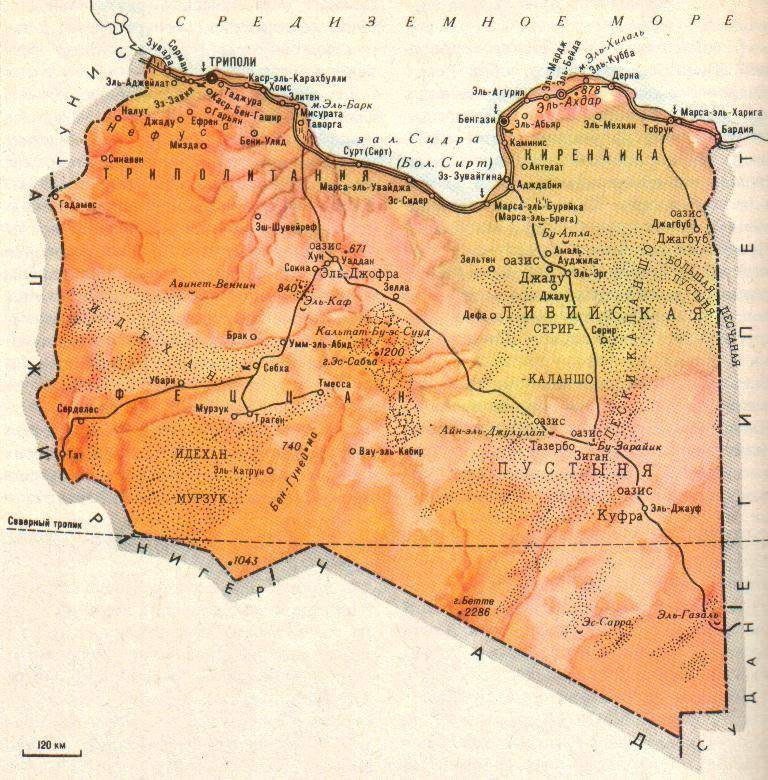
During the Second World War, Libya became the scene of the fighting of the Italian-German troops and the armies of the allies. After the war, Libya ceased to be an Italian colony, but the new owners were replaced by new contenders for the North African lands. The coastal provinces were occupied by the British, and French troops invaded the southern province of Fezzan from the territory of French Equatorial Africa. Only 24 December 1951, the country's independence was officially proclaimed. Its ruler was approved by King Idriss I - the representative of the influential Libyan family of Senusi.
However, the Libyan kingdom remained independent on paper. In fact, foreign capital continued to dominate in the country - American, English, French, Italian. The royal army was trained by foreign military advisers, foreigners actually predetermined the internal policy of the monarchy. The oil reserves found here, if they had an effect on something, were on the well-being of the royal family and a number of noble families. The vast majority of Libyans continued to live in poverty, deprived of the benefits of civilization, real rights and freedoms. Discontent with the royal regime was growing among the people, and the most prominent exponent of protest moods was the radical youth. Many young Libyans in those years were impressed by the recent overthrow of the monarchy in neighboring Egypt. Under the influence of the events in Egypt in Libya, underground groups appeared, consisting of schoolchildren and students, and then of young servicemen. One of the first illegal groups of young oppositionists emerged in the late 1950-ies. in the secondary school of the city of Sebha. Its organizer and ideologist was sixteen-year-old student Muammar al-Gaddafi.
The life path of the leader of the revolution
Muammar al-Gaddafi was born on September 13 1942 of the year in a family of Bedouin Arabs who roamed thirty kilometers from the large Libyan village of Sirte. In the family of Mohammed Abu Menyar and his wife Aisha there were six children. Nobody knew how to read and write, and did not feel a particular need for education. And only Muammar from an early age realized the need for learning, being an intelligent child over the years. At the age of nine, he was sent to elementary school in Sirte, a six-year course of which he mastered in just four years. Deciding to continue his studies, Muammar went to Sebhu - the capital of the province of Fezzan, where he enrolled in high school. There he began the path of a revolutionary, thinker and political leader.
Already at the age of fifteen, the young Gaddafi became aggressively interested in political issues. Thus, in a local newspaper in the section of letters in 1957, a letter was published by a schoolboy Muammar al-Gaddafi in which he asked two questions - what was the fate of the five Algerian leaders arrested by the French authorities, and what was the fate of the oil found in the depths of Libya. Of course, the pro-government newspaper did not answer the young man’s seditious questions. However, in 1959, an underground organization was created in Sebha. Its participants distributed leaflets, organized demonstrations against colonialism and imperialism. The biggest demonstration took place on October 5 1961, in support of the revolution in neighboring Algeria. Muammar al-Gaddafi was arrested and soon for political unreliability was expelled from school.
It did not make sense to stay in Sebhah and Gaddafi moved to Misurata, where he successfully graduated from the local lyceum in 1963. By this time, the underground organization existed as a fully formed political unit. The main focus of practical activities of its participants elected the introduction of the royal army, which required to get a military education. Gaddafi and his closest friend and ally Abdel Salam Jelloud, as well as a number of other young members of the underground, entered the Royal Military College in Benghazi. In parallel with his studies at the military college, Gaddafi attended lectures on history at the evening department of the Faculty of Arts at the University of Benghazi, where he met with politically active representatives of civilian students. It was during this period that the final formation of the core of the underground organization of anti-colonial orientation took place.
Free officers
In 1964, the first congress of the organization of young oppositionists was held on the seashore near the village of Tolmeyta. It was decided to call the organization “Free Officers Unionist Socialists” (abbreviated as OSOUS) for the three components of the motto “Freedom, unity (of the Arab nation), socialism”. The main core of the organization consisted of young military personnel - cadets of the military college, sergeants and junior officers of the Libyan royal army. Most participants are barely twenty years old.
The priority task was to develop the structure of the organization and the penetration of its members into all units and services of the armed forces. Subsequently, Rifi Ali Sheriff, a participant in the Libyan revolution, recalled: “In each military camp we had at least two officers — informants. We were interested in arming units, lists of officers, their characteristics, the mood of the personnel. ” By 1965, when Muammar al-Gaddafi and his friends graduated from the Royal Military College and received officer ranks and assignments to the troops, OSJS was already a serious and extensive underground organization.
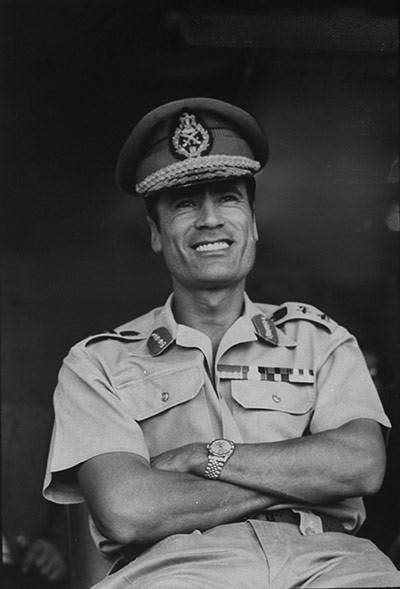 Gaddafi received lieutenant shoulder straps and was assigned to communications troops stationed in the Gary Younes military camp in 4 km. from benghazi. Gaddafi’s comrades in the organization also received appointments to various units of the armored and engineering troops. Becoming officers, members of the organization had more opportunities to develop the underground struggle. In parallel with campaigning in military units, contacts were also being established with civilian youth. However, students and young intellectuals, due to their less organization, played a less significant role in the preparation of speeches than military personnel.
Gaddafi received lieutenant shoulder straps and was assigned to communications troops stationed in the Gary Younes military camp in 4 km. from benghazi. Gaddafi’s comrades in the organization also received appointments to various units of the armored and engineering troops. Becoming officers, members of the organization had more opportunities to develop the underground struggle. In parallel with campaigning in military units, contacts were also being established with civilian youth. However, students and young intellectuals, due to their less organization, played a less significant role in the preparation of speeches than military personnel. In August 1968 of the year in Geminis, near Sirte, a meeting of the leaders of SSWS took place It was decided to create two main underground centers of the organization - in Tripoli and in Benghazi. The main responsibilities of the managers of the underground organization were distributed. The captain of the engineering troops Abdel Salam Jelloud led the underground center in Tripoli, the army investigator Mogareif - the center in Benghazi. Identified and responsible for key areas of work of the organization. Mustafa al-Harroubi was appointed to be responsible for collecting data on army units, armament, training and military counterintelligence and police activities, Awad Hamza and Rifi Ali Sheriff were responsible for organizing the communication of underground centers, Mohammed Najm was responsible for organizing communications for underground centers. ideological work among young officers - Bashir Havvadi, for the extraction of weapons and the organization of underground warehouses - Mukhtar Gervi.
Gaddafi and his associates paid much attention to the creation of underground warehouses, in which a significant amount of ammunition, machine guns, pistols, rifles were collected. The sentiments among officers and soldiers of military units stationed in Tripoli and Benghazi were analyzed, and the possibility of their participation in the performance on the side of the revolutionaries or on the side of the royal regime was taken into account.
September Revolution 1
1 September 1969, the revolutionaries' forces, divided into four groups, made simultaneous appearances in all the major cities of Libya. Practically unopposed by the police, gendarmerie, and the royal guard, the revolutionaries seized the Crown Prince’s palace, radio center, and government offices. King Idriss Al-Senusi, who was in Turkey at that time, could not believe that his power in the country had come to an end. However, the heir to the throne abdicated, and the gendarmerie, which the king considered his stronghold and the most reliable armed unit, also did not oppose the revolutionaries. The king’s attempts to get help from the American and English governments were also fruitless. Libya was proclaimed a republic. To lead the country, a Revolutionary Command Council (SRK) was established under the chairmanship of Muammar al-Gaddafi - for that period a twenty-seven-year-old captain of the communications troops.
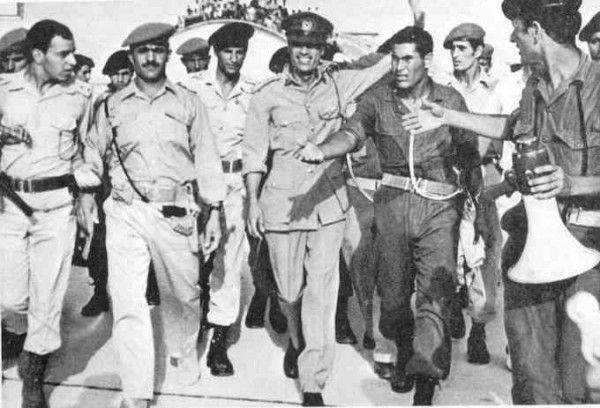
Practically from the first days of the revolution, young officers, who came to power in this backward North African country, embarked on fundamental changes in the political and economic life of the country. Historian A.Z. Yegorin in the book "The Libyan Revolution" notes that "in no other Arab country in the post-colonial period did the army officers who seized power carry out such lengthy and profound transformations as in Libya." Moammar Gaddafi made it clear that the events of 1 of September of 1969 of the year are a real revolution, and not just a military coup that the history of most African states is so rich with. September 1 1969 was the day of the revolution that set the stage for building a fundamentally different society.
Speaking at the September 16 rally, Muammar Gaddafi said: “The revolution does not claim to have its leadership concentrated only in the hands of the Revolutionary Command Council or ministers. The leadership must be given to the people who will become the highest authority, having the final word. I give the people responsibility and the right to rule the country. I give people the opportunity to develop a philosophy of revolution. ” Rejecting the capitalist path of development, the young Libyan Republic began to search for its own path - the path of building a society based on the principles of freedom, Islamic socialism, social justice and unity. In 1969, all military bases of foreign armies in Libya were eliminated.
21 July 1970, a decree was issued on the nationalization of the property of the Italian colonists, and in October 35 thousands of Italians left Libya. The property of the royal family, accumulated over the years of exploitation of the country's natural resources, was also subject to confiscation. During the 1971-1974. foreign oil companies were nationalized. Thus, oil - the main natural resource of Libya - began to bring profit not to foreign millionaires, but to the Libyan people.
Jamahiriya
The September revolution was progressive, freeing the Libyan people from slave colonial dependence. But there was another highlight in it, distinguishing it from other anti-colonial revolutions in African and Asian countries. The fact is that Gaddafi is perhaps the only one among the leaders of developing countries, and indeed the world as a whole, decided on a unique experiment to create a political model of absolute democracy, in fact involving the transfer of all power to the people. Gaddafi did not limit himself to banal anti-colonial measures - the nationalization of foreign companies and the expulsion of foreign citizens, the liberation of the country's territory from foreign military bases. He embarked on large-scale political reforms that completely changed the face of Libya for the next half a century.
Being in constant theoretical search, by the beginning of 1970-s, Muammar Gaddafi began to form the foundations of the Third World Theory, which he outlined in three parts of his famous Green Book. The content of the Green Book suggests that the worldview of the leader of the Libyan revolution has been greatly influenced by European socialist tendencies, and not an Marxist, but rather an anarcho-syndicalist one. The modern historian S. Gafurov draws parallels between the views of Muammar Gaddafi, as reflected in the Green Book, and the ideology of anarchism. By the way, Gaddafi ordered that the works of Russian revolutionaries Mikhail Bakunin and Peter Kropotkin be translated into Arabic, apparently seeing in them a certain ideological closeness to their own views. According to Gafurov, the commonality of views of Peter Kropotkin and Muammar Gaddafi was that it was the contradiction between the state form of government and society, the masses, both theorists were considered the key factors of most social problems. In the Green Book, Muammar Gaddafi emphasized the artificial nature of the state, which, according to the Libyan leader, had nothing to do with the true aspirations of humanity.
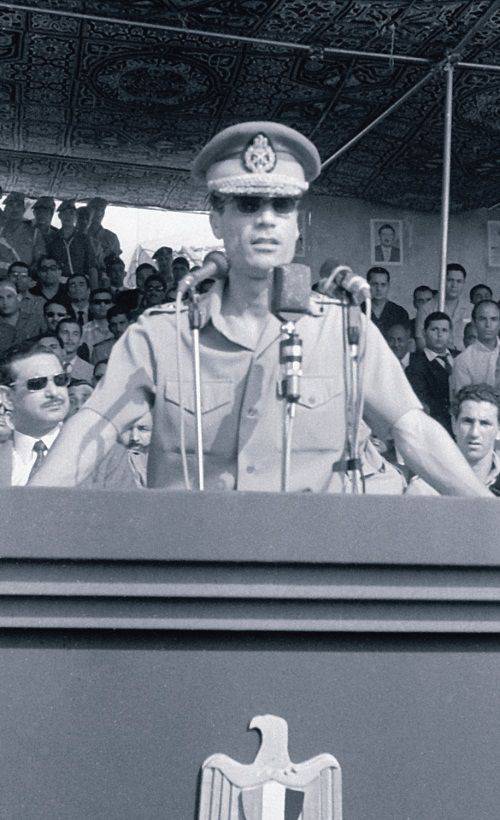
In 1976, the Arab Socialist Union, a mass public organization that constituted support for the revolutionary course by the population of the country, was transformed into the General People’s Congress (VNK), created on a territorial and production basis. 2 March 1977, the following fundamental principles of popular authority were adopted at the General People’s Congress session:
1. the willingness of the Libyan people to defend their freedom and support all oppressed peoples of the world;
2. the struggle for such socialism, which would provide private and public property;
3. the struggle to protect the rights of Libyan citizens against traditional forms of power: personal, family, tribal, party and class;
4. the struggle for Arab unity.
In connection with the adoption of the Declaration on the Establishment of the Power of the People, the Libyan Arab Republic was renamed and was named the Socialist People’s Libyan Arab Jamahiriya (SNLAD). The term “Jamahiriya” was coined by the world political philosophy of Muammar Gaddafi, it can be translated from the Arabic language as “democracy.” In fact, the Jamahiriya can be considered as a form of direct democracy, when people exercise power through grassroots people's congresses, people's committees and trade unions united in the General People's Congress. The habitual state apparatus in the Jamahiriya was actually liquidated, and the general secretary elected by them became the leadership body during the breaks between the sessions of the General People’s Congress.
Formation of the national congress was carried out, as already noted above, on a production and territorial basis. Local congresses were formed in each locality, uniting all male and female citizens who have reached 18 years. in the period between sessions of local people's congresses, the functions of management were carried out by people's committees, whose members were elected from among the most worthy and competent representatives of the people's congress. At the same time, Muammar Gaddafi himself retained only the informal title of leader of the Libyan revolution, abandoning formal government posts.
Factories - to labor collectives
In addition to political reforms, Muammar Gaddafi turned to social and economic transformations in the life of Libyan society. In the second part of the Green Book, devoted to the economic aspects of the third world theory, he argued that the wage labor system is only modified slavery. Speaking against private ownership of the means of production and against the exploitation of hired labor by private entrepreneurs, Gaddafi, unlike the Soviet leaders, did not make concessions for state property either. Employees of state-owned enterprises, according to Gaddafi, are the same hired workers as employees of private enterprises, since they work not for themselves, but for the owner. Only in the case of state-owned enterprises, the state through the state and factory bureaucracy acts as an aggregate capitalist.
In early September, 1978 launched a campaign in Libya to transform state and private enterprises into national enterprises. This was supposed to be done by transferring the means of production and management functions directly into the hands of workers and employees. At the rally, Gaddafi called on Libyans "to seize factories and enterprises, to liquidate the existing administration, which is bureaucratic in the state and exploitative in the private sector, create in its place a people's administration from among the workers and take production management in their hands." Already by October 15 1978, 320 of state and private enterprises, including a textile mill, an electrical cable plant and cement factories, passed into the hands of working teams. At the seized enterprises, the highest governing bodies proclaimed general meetings of workers and employees - the Primary People’s Congress. His functions consisted in approving the general direction of development and activity of enterprises, reviewing draft budgets, and developing proposals for modernizing the structure of enterprises. For direct management of the enterprise’s activity and the production process, national committees were formed from among the most deserving and technically competent workers and employees, which, depending on the number of employees of a particular enterprise, included from three to ten delegates of the enterprise’s labor collective.
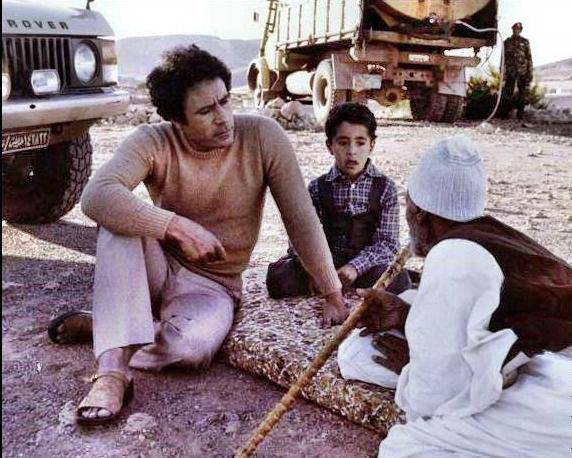
Armed people
Another major task in the conditions of political and economic transformations in Libya was the cardinal modernization of the country's armed forces and its military policy. In the conditions of life in a hostile imperialist environment, the defense of the gains of the revolution has become a sacred duty for every citizen of Libya. From the very first days of the revolution, its leaders made it clear that from now on, the army, the police, and the security organs of the Libyan state completely change their face. If in the royal Libya the armed forces were intended, first of all, to suppress their own people and their protest speeches, in the Jamahiriya the main task of the country's armed forces was to protect the country and the people from external imperialist aggression.
Muammar Gaddafi put forward the concept of "armed people", in accordance with which real militia was created in Libya, bringing together all the inhabitants of the country at the age of 14-35 years, regardless of gender and social status. Each militia passed military training and was considered conscripted. With a population of three million, the strength of the armed forces of the Jamahiriya reached 100 thousands of troops.
At the same time, Libya, during the reign of Gaddafi, did not limit herself to purely defensive measures. The Jamahiriya was active in supporting revolutionary and national liberation movements in all parts of the world. Perhaps, after the Soviet Union and China, the Libyan Jamahiriya was the most active ally of all kinds of "red" and national liberation insurgent movements. At various times, the Irish Republican Army, the Palestinian national liberation organizations, the partisan fronts of Sudan, Eritrea, Chad, Western Sahara, Namibia, Somalia, and the Philippines used the help of Muammar Gaddafi and the people of Libya. For this support of Muammar Gaddafi, Western politicians and the media accused of sponsoring international terrorism, for some reason forgetting to add that both American, and British, and French special services were just as actively supplied with money and weapons, trained and supported other partisans and terrorists, only from organizations of the "correct" (for the West) ideological orientation.
Muammar Gaddafi for a long time remained the most prominent political authority for the entire African continent, taking advantage of the well-deserved respect and sympathy from the heads of many African states. The ideology of the Green Book and the Third World Theory has had a definite influence on the policies of West African countries like Benin during the years of Mathieu Kereku and Burkina Faso during the years of the captain of worthy people Thomas Sankar and Ghana during the years of Jerry Rollings. They borrowed a lot from the models of the political and economic structure of the Libyan Jamahiriya, trying to modernize their own countries on the model of Libya. However, Gaddafi was just as fiercely hated, not only by the West, but also by the Arab conservative monarchies of the Persian Gulf. Gaddafi’s relations with Middle Eastern countries independent of American policy, including Iran and Syria, were strained enough. Iran saw in Gaddafi a rival for influence in the Islamic world, in the anti-American camp, and then he could not forgive Gadhafi for turning the latter in relations with the United States and Israel.
During the reign of Gaddafi, Islam was elevated to Libya as a national ideology. Even the flag of the country in the era of the Jamahiriya was a clean green cloth. Gaddafi himself regularly referred in his articles and speeches to the values of Islam, but Islam, in his understanding, differed significantly from those ideas about him that are cultivated in the Western media. Although Gaddafi strongly emphasized the Islamic nature of the revolution, he was no less irreconcilable to fundamentalists than he was to the American imperialists. According to Gaddafi, conservative fundamentalism pulls the Arab countries into the past, interferes with their natural development and that is why it is so beneficial to American and European capital, which supported many radical fundamentalist movements in Arab countries. After all, the feudal monarchies of the Persian Gulf for many decades are the closest strategic allies of the United States and Britain in the Arab world. Ultimately, they played a key role in unleashing a bloody war in Libya, destroying the Jamahiriya and the treacherous murder of Muammar Gaddafi.
The de facto equalization of women's rights has become a major achievement of the Libyan revolution. Although the Libyans formally received all civil rights during the reign of King Idriss Al-Senusi, in reality they continued to remain in domestic slavery and could not effectively use formal equality. A supporter of women's equality, Muammar Gaddafi spoke in favor of monogamy, arguing that a Muslim should be content with one wife in modern conditions. The revolution has opened up new, previously inaccessible, opportunities for the women of Libya. Libyan women gained access to public administration, becoming full members of the people's congresses and people's committees. They received the right to serve in the armed forces of the Jamahiriya. Practically in no country of the world, except the constantly fighting Israel, the DPRK and the Libyan Jamahiriya, girls and women were not called up for military service in peacetime. However, in Libya, they carried military service on a par with men, and it was from the women that the elite guard was formed, which carried out the personal guard of Muammar Gaddafi. Beautiful girls in khaki uniforms and crimson berets, who served to protect the Libyan leader, more than once saved him from assassinations by fanatics - fundamentalists or agents of American special services.
The living standards of the Libyans during the years of the Jamahiriya could only be envied. The revolutionary changes in the country radically changed her face. A program was implemented for the construction of comfortable and affordable housing, thanks to which thousands of Libyans moved from tents to apartments. Free medical care was introduced in the country, and the diseases typical for the impoverished Libya of the monarchy period were practically eliminated. Naturally, education was free during the years of the Jamahiriya, both at school and higher. The number of students in the Jamahiriya was many times greater than the total number of students and students in royal Libya.
Death of the Jamahiriya and its leader
However, despite the numerous achievements and half a century of experience of an amazing social experiment in the once backward Libya, Colonel Gaddafi had to witness the tragic collapse of the business of his life and the victim of those who destroyed the independent and once thriving country. It is possible that the population of the country turned out to be unworthy of a man who put his whole life on the altar of his prosperity. The Libyan revolution did not succeed in producing a radical break-up of the social structure of the old Libyan society, which inevitably crawled out during the aggravation of the situation during the beginning of mass protests in the country. Tribal differences, cronyism and corruption inherent in many African and Asian states, in the case of the Libyan Jamahiriya, played their fatal role no less than Gaddafi’s numerous miscalculations in foreign policy.
The high standard of living provided by Gaddafi’s policy in the Libyan Jamahiriya entailed the disintegration of Libyan society. In fact, it has lost the features of a revolutionary mobilization-type society and turned into an analogue of Western consumer society. At the same time, the specifics of the political regime in Libya still differed from European states and the Libyan youth who had access to the Internet, visited Europe, tried to overthrow the “dictator” so that life in the country began to resemble a “European fairy tale”. The “bloody Maidan” in Libya, which led to the actual destruction of this country as an independent actor of world politics, was the result of this “Westernization” of Libyan society, overly admired by its revolution leader. Despite the revolutionary ideology set by society, in reality there were no serious prohibitions in Libya by which Gaddafi could limit Western influence in the country. He did not seek to introduce them, because in the last years of his reign he hoped for the establishment of a long-awaited peace in foreign policy relations with the United States and Western Europe, hoping that Barack Obama - “the son of Africa” - would become a figure making a cardinal turn in the relations between the US and the West in general with the Arab world, with the countries of the African continent.
But Muammar was wrong. Gaddafi's attempts to flirt with European states did not bring him any benefit in the end. In an effort to secure good neighborly relations with European leaders, the Libyan colonel believed in their "civilization", that they would not so treacherously overthrow the existing political system in Libya, plunging the country into the abyss of senseless bloodshed. Today, the Libya built by Gaddafi and his associates is no more. Muammar and most of his true and loyal supporters died, desperately resisting the attempts of the "opposition" and its American-European masters to destroy the Libyan statehood. Unfortunately, the “colonel of the desert” and his soldiers failed to defend the independence of their homeland, which will never detract from his merits in conducting a grandiose revolutionary experiment in Libya.
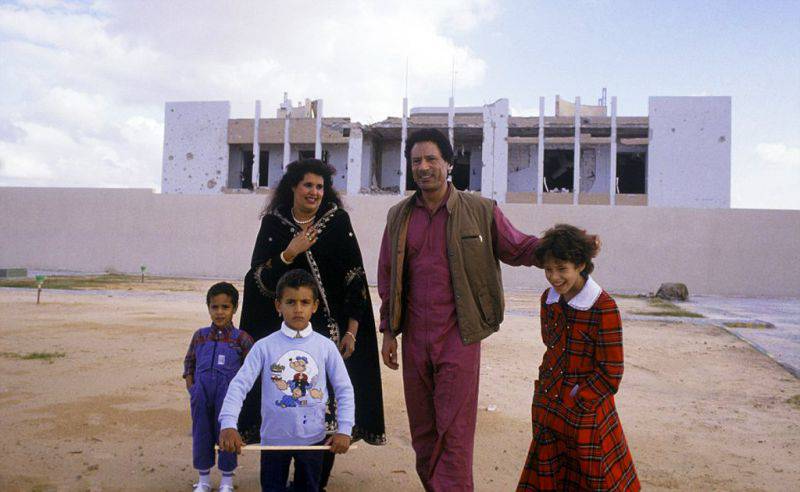
Information